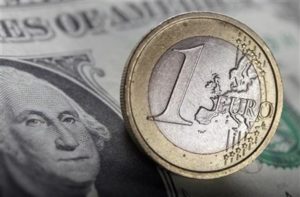 The euro plunged to the lowest point in two weeks against the US dollar on Friday, as yesterdays weak economic data released out of the Euro zone would prompt the European Central Bank (ECB) to consider a cut in its benchmark interest rate.
The euro plunged to the lowest point in two weeks against the US dollar on Friday, as yesterdays weak economic data released out of the Euro zone would prompt the European Central Bank (ECB) to consider a cut in its benchmark interest rate.
EUR/USD fell to a session low at 1.3518 at 7:15 GMT, also the pairs lowest point since October 17th, after which consolidation followed at 1.3533, still losing 0.38% for the day. Support was likely to be received at October 17th low, 1.3516, while resistance was to be encountered at October 17th high, 1.3682.
According to data by Eurostat released on Thursday, the preliminary annual consumer price index in the Euro zone, evaluated in consonance with the harmonized methodology, climbed 0.7% in October, marking the slowest pace since November 2009, after in September the index rose 1.1%. Inflation rate diminished in Germany and Spain, with the annual CPI in these countries rising only 0.1% in October. This data puts more pressure upon the European Central Bank (ECB) to increase the money supply and support economic activity. The ECB has said there was a “subdued outlook” for price growth in the common currency bloc, while the October data marked the ninth consecutive month, during which the inflation rate has been below bank’s 2% objective, a level considered as providing price stability.
At the same time, the rate of unemployment in the Euro zone reached a record level at 12.2% in September, after in August the rate has been revised up to 12.2% from 12.0% previously.
The European Central bank will probably reduce its benchmark interest rate to 0.25% from the current 0.5% at its policy meeting in December, according to projections published yesterday in a client note by Greg Fuzesi, an economist at JPMorgan Chase & Co. in London, Bloomberg imparted.
Additionally, traders predict that the ECB will increase its main refinancing rate by 9.1 basis points during the next 12 months, or the least since July 19th, according to a Credit Suisse Group AG index.
Meanwhile, EUR/USD came under additional pressure after business activity in the Chicago region expanded at the fastest pace since March 2011 in October, with the corresponding PMI rising to a value of 65.9, or considerably above expectations, which pointed the index will slow down to 55.0.
US dollar, on the other hand, received steady support yesterday, after the Federal Reserve Bank decided to maintain the current pace of its asset purchases unchanged at its policy meeting, as widely anticipated, because more evidence of an improving economic activity was to be obtained. The US central bank left without change its statement that it will probably maintain the benchmark interest rate close to zero at least as long as the rate of unemployment in the country is above 6.5% and as the inflation outlook is not exceeding 2.5%.
The Institute for Supply Management (ISM) is expected to report that its manufacturing activity index slowed down to 55.1 in October from a value of 56.2 during the preceding month, or the highest level since April 2011, according to the median estimate of economists participated in a survey by Bloomberg News. Official result is scheduled for release later in the day.
Lastly, Markit Economics is to report that the final value of its manufacturing PMI for the United States came in at 51.1 in the month of October, or unchanged in comparison with a month ago.
Elsewhere, the euro was losing ground against the British pound, as EUR/GBP cross dipped 0.15% on a daily basis to trade at 0.8459 at 8:22 GMT. EUR/JPY pair was falling even more, 0.54% to trade at 132.97 at 8:24 GMT.





